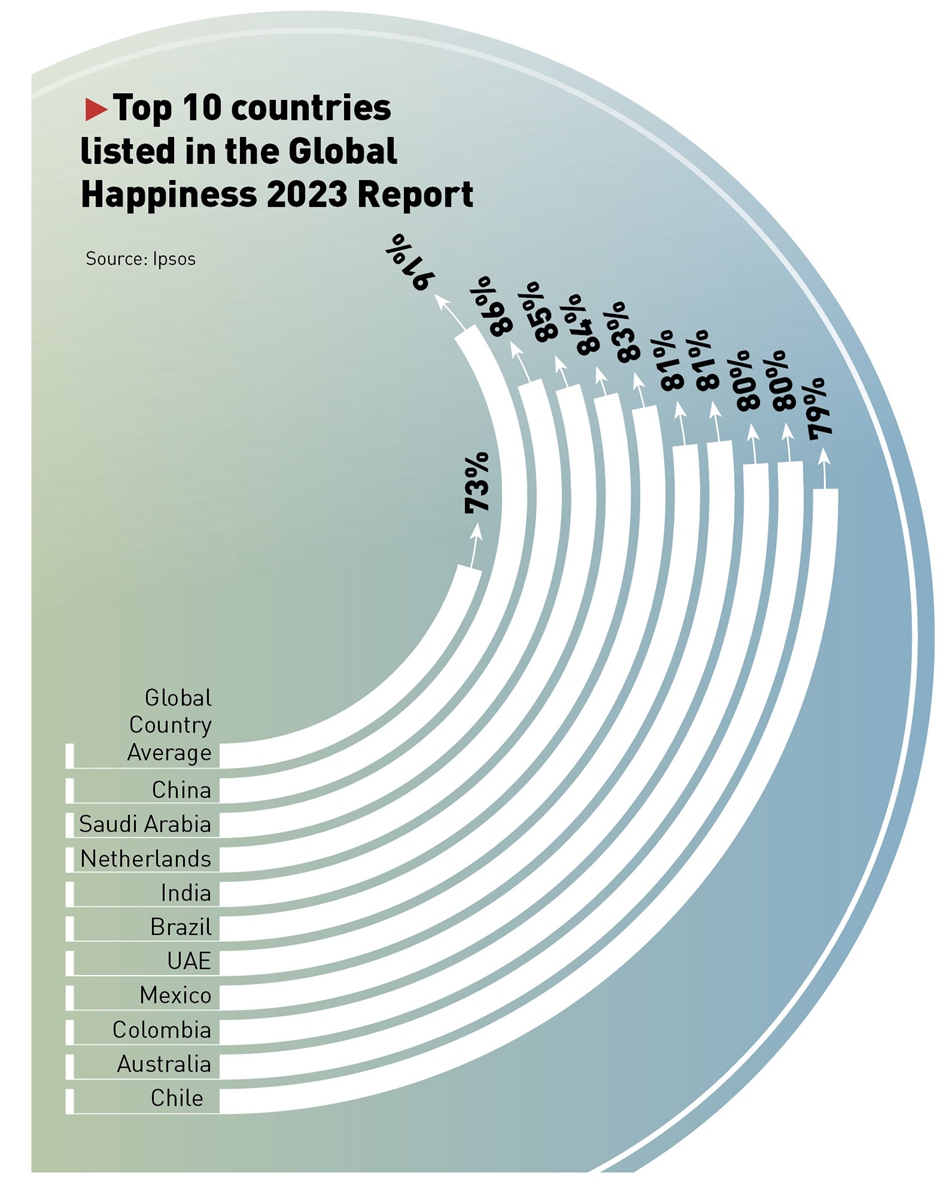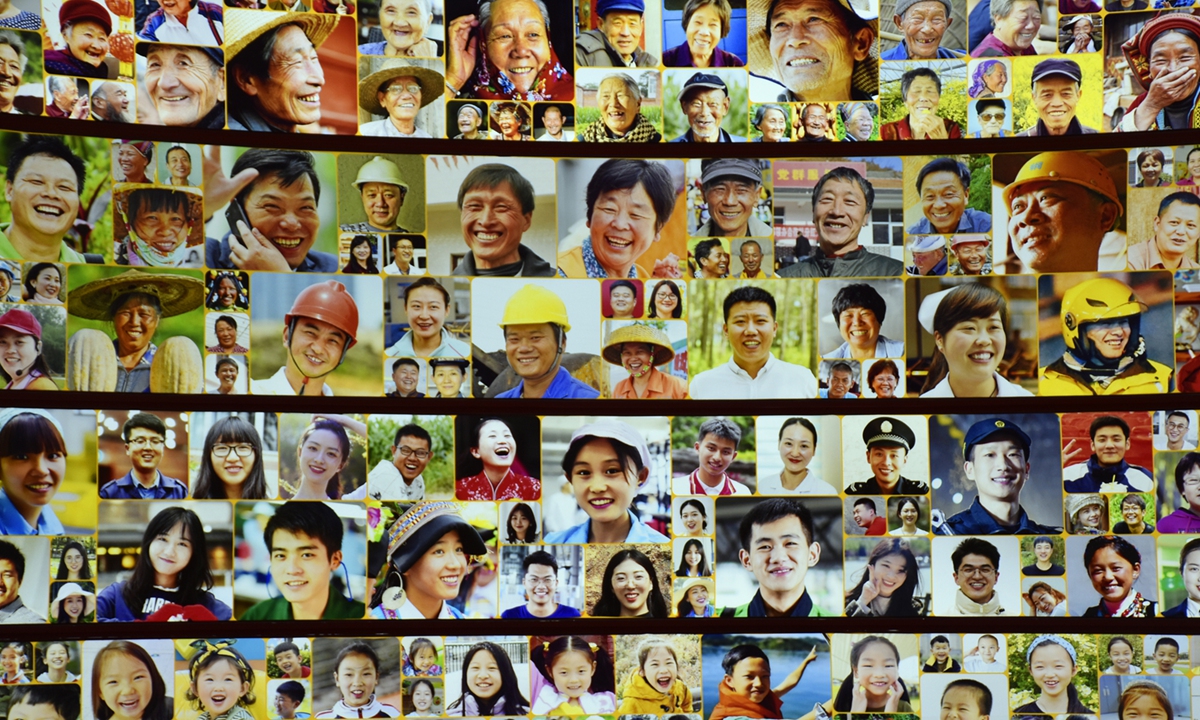A photo taken on November 6, 2022 shows a wall displaying photos of smiling people at an exhibition themed "Forging Ahead in the New Era," which showcases China's achievements and development over the last decade, at the Beijing Exhibition Center. Photo: VCG
Chinese Path to happiness
"Are you happy?" This simple question is not only a daily greeting in Putonghua but also a yardstick on which global authorities attach importance when formulating policies to better serve their people. Recent international surveys showed that the happiness of people in the Chinese mainland has largely increased in recent years, with one of the survey reports suggesting that Chinese people are among the happiest in the world.
The Global Happiness 2023 Report, released by multinational market research and consulting firm Ipsos ahead of the International Day of Happiness on March 20, showed that Chinese people are the happiest among the 32 countries and regions sampled, with 91 percent of Chinese respondents saying they are generally happy, 12 percent increase from a decade ago.
The 2023 World Happiness Report, an annual publication by the United Nations Sustainable Development Solutions Network in which Nordic countries typically rank higher than China, ranked the Chinese mainland 64th out of 137 countries and regions this year, 30 places higher compared with 2020.
The surveys, with different questionnaires and ranking methods, all imply that people in the Chinese mainland are generally happier, and even rank as the happiest in certain aspects, observers found.
Why are Chinese people happier than before? The Global Times reached Ipsos, as well as China-based and international sociologists and culture scholars, along with ordinary citizens, to find out the possible reasons behind the overall increase in happiness among Chinese people.

Graphic: GT
Family, friends matter most
"Thanks to family and friends, Chinese people are the happiest people in the world," declared a South China Morning Post article on March 21 according to conclusions made by the Ipsos survey report, saying that "relationships are a main source of happiness in China."
The importance of family and social ties to the happiness of Chinese people is clearly indicated in the Ipsos survey, which showed that Chinese respondents are more satisfied with "children," "relationship with a partner or spouse" and "friends" compared to other aspects. While some Western respondents are more satisfied with elements related to their personal circumstances and feelings, such as "access to or being in touch with nature" and "level of education."
Traditional Chinese societal values are manifested in the results, as Chinese people have a strong drive toward family harmony, as the old Chinese saying goes, "harmony at home brings prosperity," said Zhang Yiwu, a literature professor at Peking University.
Chinese people are more inclined to feel happiness in kinship and social relationships, Zhang said. "Even if one is not wealthy, he or she can gain a lot of happiness from having a happy and warm family, as well as many friends as a source of support," he told the Global Times.
Psychologist Zhang Jiehai agreed. "Chinese society is a society of interpersonal relationships, and good interpersonal relationships have a great impact on the happiness of Chinese people," said Zhang Jiehai.
Ipsos surveyed 32 countries and regions that represent over 80 percent of the world's GDP, said Nicolas Boyon, Senior Vice President of Ipsos Public Affairs in the US, in an email response to the Global Times.
Boyon said that the list of life aspects mentioned in the survey questionnaire was carefully designed, so each of them is relevant to all people in every country and region, and can be understood similarly. "Our main goal is consistency both across cultures and over time," he wrote.
Satisfied with China's economic, social, political situation
The economic, social, and political situations in a country or region also largely affect the happiness of the people there.
Compared to most non-Chinese respondents who expressed low satisfaction with their "country's economic situation" and "country's social and political situation," which led to overall average satisfaction rates in both aspects at a mere 40 percent, Chinese respondents expressed greater satisfaction in China's economic, social, and political situations.
Some 78 percent and 83 percent of Chinese respondents said they are satisfied with the "country's economic situation" and "country's social and political situation" respectively, ranking third and first among all countries and regions, the survey showed.
Zhang Jiehai said that Chinese society is stable, and its senses of fairness and justice keep increasing.
He mentioned the enhancement of the quality of life for Chinese citizens as a result of the increased happiness in the stable Chinese society.
"Foreign studies have shown the close relationship between 'not pocketing the money one has picked up' and citizens' happiness," he said. "In an experiment carried out on streets of different countries, Denmark had the highest percentage of people who return money found, and they are usually ranked as one of the happiest citizenries in the UN's happiness indices."
Similarly, China has probably the lowest percentage of express deliveries being stolen, which is also highly related to the strong sense of happiness of the people there, Zhang Jiehai exampled. "Unsupervised express packages and food deliveries placed at entryways and hospital inpatient departments are a common sight in China," he added. "Incidents of deliveries being stolen are rare as the quality of life of Chinese citizens has improved."
Recalling his days at Peking University in 2022 as a Korean scholar, Kwon Ki-sik, head of the Korea-China City Friendship Association, believes that four main factors contribute to the high level of happiness of Chinese people.
First, Chinese people highly trust the country's political system. Kwon said that Chinese people's unwavering support for the Communist Party of China (CPC) and its leaders are a source of stability in China, in sharp contrast to certain Western countries where political instability has led to general discontent.
The second is safety. Big Chinese cities including Beijing and Shanghai are among the few in the world in which one can walk freely at night thanks to good public security, whereas some security problems seen in several big US cities keep many people from venturing outside after dark, said Kwon.
Third, Chinese people are incredibly proud of the country's development and prosperity, as China has achieved remarkable economic growth over the decades of reform and opening-up. Kwon believes this sense of pride is greatly linked to the happiness of Chinese people.
Fourth, Chinese people are satisfied with the government's efforts in building a moderately prosperous society and in achieving common prosperity. "The mutual trust between the CPC and its people is the root of happiness for Chinese people," Kwon noted.
The three recent Ipsos happiness surveys conducted in August 2020, December 2021, and January 2023, revealed that 93 percent, 83 percent, and 91 percent of Chinese respondents were happy, respectively, ranking first, third, and first among all polled countries and regions.
The pandemic was a source of worry for the world. Nonetheless, compared to some Western countries' approach of "lying flat," which caused a lot of deaths, "China's COVID prevention measures protected the lives of the overwhelming majority of people," Zhang Yiwu told the Global Times. "On the whole, we got through the pandemic smoothly."
Common expectations
In the 2023 World Happiness Report released by the UN Sustainable Development Solutions Network, Finland was ranked as the happiest country in the world. The Chinese mainland was ranked at the 64th, higher than 2022 when it was ranked 72nd, and in 2021 at 84th.
Referring to the different ranking results between the report and the Ipsos survey, Boyon said that the two differ in several ways and are also complimentary. The UN Happiness Index, as reported in the World Happiness Report 2023, is based on data from a survey in which respondents were asked to rate how they feel about their life ranging in responses from "the best possible life" to "the worst possible life." It is described as a "subjective well-being score," Boyon said.
"Ipsos' survey asks a different question: 'All things considered, would you say that you are very happy, rather happy, not very happy, or not happy at all?' The self-reported level of 'happiness' from our survey can be seen as a reflection of people's mood," he added.
Also, Boyon said that Ipsos' survey is collected during the same two-week period in every country, which makes its data more current, and more sensitive to seasonality and current events.
Moreover, as the Ipsos survey is conducted online, its samples can be considered representative of their general adult population under the age of 75, Boyon explained. "But in most 'middle-income countries' or 'emerging markets,' including China, online samples tend to be more urban, more educated, more affluent than the general population," he told the Global Times.
The World Happiness Report team said on its website that it uses observed data on six variables including GDP per capita, social support, healthy life expectancy, freedom, generosity, and corruption.
These variables are more susceptible to income inequality, said Zhang Jiehai. "Countries and regions with more developed economies, smaller income gaps, and a relatively high sense of fairness usually score higher," he explained. "That's why Nordic countries have been at the top of the UN's happiness rankings for long."
Happiness surveys with distinct indicators have different results, but generally, people from all over the world share some common expectations, like narrowing the income gap, improving fairness and justice, and elimination of corruption, Zhang jiehai noted.
To further enhance Chinese people's sense of happiness, experts suggest authorities work harder in improving social welfare systems, especially in those in the fields of healthcare and rural elderly care services.
"China has made rapid progress in social welfare improvement. Nonetheless, as a developing country with a large population, it's difficult to compare China's per capita social welfare standard with that of Nordic countries," said Zhang Yiwu. "It varies from country to country in terms of their strengths and challenges."
UK's falling ranking
"China is the happiest place on earth as the UK falls in rankings," said an article published on the Northamptonshire Telegraph website on March 24. The Ipsos survey found that 70 percent of British people considered themselves happy, a 13 percent drop from 2022.
Fleur, a retired teacher living in London, told the Global Times reporter that she does feel less happy than about a decade ago mainly because of the economic pressure she experiences. Fleur said her pension is falling in value under high inflation in the UK, and she and people around her feel uneasy about several persisting problems in British society, including the widening wealth gap, the rising crime rate, and the falling employment rates.
In the US, just 12 percent of respondents described themselves as "very happy," "the lowest share on record since NORC began asking the question…in 1972," according to a US domestic survey released by The Wall Street Journal and the social research organization NORC at the University of Chicago on March 24. Some 30 percent said they are "not too happy."
Financial circumstances are main happiness contributors for some Westerners, analyzed Zhang Jiehai. In a few European countries, for instance, people are faced with slow income growth and fast-rising living costs. "Their living standards are seeing a downward trend when compared with their predecessors. A blue-collar couple can hardly maintain their standard of living after retiring if their children are also blue collars," Zhang Jiehai said.
Source link
Remaining time 0:57
Related posts:


Boosting your 'happiness hormone' raises your mood, productivity and success levels. getty Here’s a double
combo to increase yo...









 Graphic: GT
Graphic: GT


GDP by countries 1820-2022